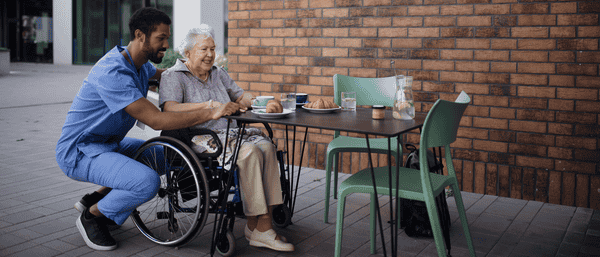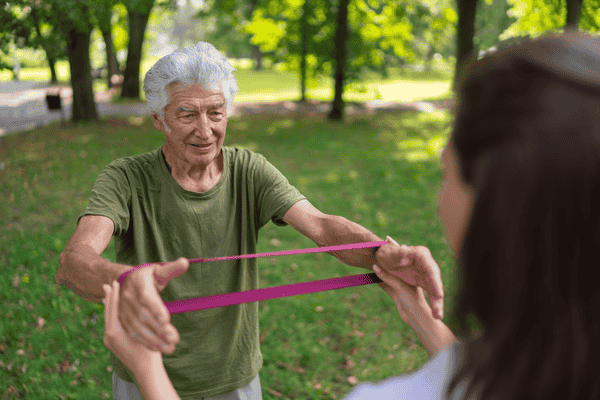Are you ready to embark on the fulfilling journey of mastering the art of caregiver services, where compassion meets expertise, and care transforms lives? Picture this: you’re a new family caregiver facing the complexities of caregiving, navigating through a maze of responsibilities and emotions with grace and determination. How do you provide the best possible care and create a positive impact in someone’s life?
In this comprehensive guide, we dive deep into the essential insights and nuances of caregiver services, offering invaluable tips and advice for both new caregivers and seasoned healthcare professionals alike. From understanding the different types of support services available to ensuring client transportation safety protocols are met, we’ve got you covered. Join us as we explore the heartwarming world of caregiver services, where every act of care, no matter how small, makes a significant difference. Get ready to empower yourself with the right knowledge and resources to navigate the intricate journey of providing exceptional care to those in need.
Understanding Caregiver Services
Caregiver services encompass a wide range of support activities aimed at helping individuals who need assistance with daily living due to age, illness, or disability. These services are vital for maintaining the health, safety, and well-being of clients, allowing them to live more independently and with dignity.
At the heart of caregiver services lies a profound commitment to improving the quality of life for those in need. It’s a calling that requires not only practical skills but also a deep well of empathy, patience, and understanding. Caregivers are the unsung heroes who dedicate their time and energy to ensure that their clients receive the care and support they deserve, whether it’s helping with daily tasks, providing medical assistance, or simply offering a listening ear and a comforting presence.
The Story of Sarah and Mr. Thompson
To truly understand the essence of caregiver services, let’s delve into the story of Sarah, a dedicated caregiver, and her client, Mr. Thompson. Sarah’s journey as a caregiver began when she met Mr. Thompson, an elderly gentleman who required assistance due to his advancing age and declining health. From the moment she stepped into his life, Sarah knew that her role would be more than just a job; it would be a calling that would transform both of their lives.
Each morning, Sarah arrives at Mr. Thompson’s home with a warm smile and a heart full of compassion. She begins her day by assisting him with his morning routine, helping him bathe, dress, and groom himself. With gentle hands and a patient demeanor, Sarah ensures that Mr. Thompson feels comfortable and ready to face the day ahead. This personal care is just one of the many facets of the caregiver services Sarah provides.
As the day progresses, Sarah seamlessly transitions into her role as a household support provider. She takes on the responsibility of managing Mr. Thompson’s household tasks, from preparing nutritious meals that cater to his specific dietary needs to keeping his living space clean and tidy. Sarah understands that a pleasant and organized environment plays a crucial role in promoting Mr. Thompson’s overall well-being and sense of comfort.
But Sarah’s responsibilities extend far beyond the realm of practical assistance. She is also a vital source of emotional support for Mr. Thompson. With a keen understanding of the challenges that come with aging and illness, Sarah makes it a priority to spend quality time with her client, engaging him in meaningful conversations and providing a listening ear whenever he needs it. She recognizes the importance of combating loneliness and isolation, which can have a profound impact on the mental and emotional well-being of elderly individuals.
Types of Caregiver Services
Caregiver services encompass a wide range of support activities that cater to the unique needs of each individual. These services can be broadly categorized into the following areas:
- Personal Care: Assisting with activities of daily living, such as bathing, dressing, grooming, and toileting, to maintain the client’s hygiene and comfort.
- Household Support: Managing household tasks, including meal preparation, light housekeeping, laundry, and grocery shopping, to ensure a clean and well-maintained living environment.
- Medical Care: Administering medications, monitoring vital signs, and coordinating with healthcare professionals to ensure the client receives appropriate medical attention and follows prescribed treatment plans.
- Emotional Support: Providing companionship, engaging in conversations, and offering a listening ear to combat loneliness and promote emotional well-being.
- Transportation: Ensuring safe and reliable transportation for medical appointments, social activities, and other essential errands.
The Responsibilities of a Caregiver
Being a caregiver like Sarah requires a unique blend of practical skills, emotional intelligence, and unwavering dedication. The primary responsibilities of a caregiver extend beyond the day-to-day tasks and encompass a holistic approach to ensuring the client’s overall well-being.
Assessing Needs
One of the fundamental responsibilities of a caregiver is to regularly assess the client’s physical, emotional, and social needs. This involves observing and documenting any changes in the client’s condition, such as mobility issues, cognitive decline, or emotional distress. By staying attuned to the client’s evolving needs, caregivers can adapt their approach and provide tailored care that addresses specific concerns.
Creating Care Plans
Based on the assessment of the client’s needs, caregivers develop and implement personalized care plans. These plans outline the specific tasks, routines, and interventions that will be carried out to ensure the client’s well-being. Care plans are dynamic documents that are regularly reviewed and updated to reflect any changes in the client’s condition or preferences. By creating comprehensive care plans, caregivers can provide consistent and efficient care that meets the client’s unique requirements.
Monitoring Health
Caregivers play a crucial role in monitoring the client’s health and detecting any potential issues or complications. This involves keeping track of vital signs, such as blood pressure and temperature, and being vigilant for any changes in the client’s physical or mental state. Caregivers also ensure that medications are administered as prescribed and monitor for any adverse reactions or side effects. By closely monitoring the client’s health, caregivers can promptly address any concerns and collaborate with healthcare professionals to ensure timely interventions.
Providing Personal Care
Personal care is an essential aspect of caregiver services, as it directly impacts the client’s comfort, hygiene, and dignity. Caregivers assist with activities of daily living, such as bathing, dressing, and grooming, while maintaining a respectful and compassionate approach. They also help with toileting and incontinence care, ensuring that the client’s hygiene needs are met with sensitivity and discretion. By providing personalized care, caregivers help clients maintain their independence and self-esteem.
Ensuring Safety
Caregivers are responsible for creating a safe and secure environment for their clients. This involves assessing the home for potential hazards, such as tripping risks or inadequate lighting, and implementing necessary modifications. Caregivers also assist with mobility and transfer tasks, using proper techniques to prevent falls and injuries. They develop emergency preparedness plans and are trained to respond to any crisis situations that may arise. By prioritizing safety, caregivers provide peace of mind for both the client and their loved ones.
Offering Emotional Support
Caregiving extends beyond physical assistance; it also involves providing emotional support and companionship. Caregivers build trusting relationships with their clients, offering a listening ear, engaging in meaningful conversations, and providing reassurance during challenging times. They understand the importance of social interaction and strive to create opportunities for the client to engage in activities they enjoy. By offering emotional support, caregivers help combat feelings of loneliness and depression, promoting the client’s overall well-being.
Qualifications and Skills Needed
To excel in the role of a caregiver, individuals must possess a unique combination of qualifications and skills that enable them to provide exceptional care. While formal education and certifications can be valuable, the essence of caregiving lies in the personal qualities and attributes that allow caregivers to connect with their clients on a deep, meaningful level.
Compassion and Patience
At the core of caregiving lies compassion—the ability to empathize with the client’s experiences, understand their struggles, and respond with kindness and understanding. Caregivers must have a genuine desire to help others and a willingness to go above and beyond to ensure their clients’ well-being. Patience is equally crucial, as caregivers often work with individuals who may have physical limitations, cognitive impairments, or emotional challenges. The ability to remain calm, understanding, and supportive in the face of difficult situations is a hallmark of a skilled caregiver.
Medical Knowledge
While caregivers are not expected to have the same level of expertise as healthcare professionals, a basic understanding of medical conditions and treatments is essential. This knowledge enables caregivers to recognize changes in their clients’ health, administer medications accurately, and respond appropriately to medical emergencies. Caregivers should be familiar with common age-related conditions, such as dementia, arthritis, and heart disease, and be able to provide appropriate support and assistance. Ongoing training and education can help caregivers stay up-to-date with the latest best practices in caregiving.
Communication Skills
Effective communication is a vital skill for caregivers, as it forms the foundation of building trust and rapport with clients and their families. Caregivers must be active listeners, able to understand and respond to their clients’ needs and concerns. They should be able to explain complex medical information in a way that is easily understandable and provide clear instructions when necessary. Caregivers also serve as a liaison between the client and healthcare professionals, advocating for their clients’ needs and ensuring that all parties are well-informed and working towards a common goal.
Physical Stamina
Caregiving can be physically demanding, requiring strength, endurance, and the ability to perform tasks such as lifting, transferring, and assisting with mobility. Caregivers must be able to safely support their clients during daily activities, such as bathing, dressing, and moving from one location to another. They should also be able to maintain their own physical well-being, practicing proper body mechanics and self-care to prevent injury and burnout. Regular exercise, a healthy diet, and sufficient rest are essential for caregivers to maintain the physical stamina required for their demanding role.
Problem-Solving Abilities
Caregiving often involves navigating complex situations and finding creative solutions to challenges that arise. Caregivers must be able to think on their feet, adapt to changing circumstances, and make sound decisions under pressure. They should be proactive in identifying potential issues and developing strategies to address them before they escalate. Problem-solving skills are particularly important when dealing with clients who have cognitive impairments or behavioral challenges, as caregivers must find ways to ensure their clients’ safety and well-being while respecting their dignity and autonomy.
The Benefits of Caregiver Services
The impact of caregiver services extends far beyond the practical assistance provided; it has the power to transform lives and create lasting, positive change for both clients and caregivers alike.
Benefits for Clients
For clients like Mr. Thompson, the presence of a dedicated caregiver like Sarah brings immeasurable benefits that enhance their quality of life and overall well-being.
Enhanced Quality of Life
Caregiver services provide clients with personalized care that is tailored to their unique needs and preferences. By assisting with daily tasks, such as bathing, dressing, and meal preparation, caregivers help clients maintain their independence and dignity. This support allows clients to continue living in the comfort of their own homes, surrounded by familiar surroundings and cherished memories. The one-on-one attention and care provided by caregivers contribute to a higher quality of life, enabling clients to age gracefully and with a sense of purpose.
Safety and Security
The presence of a skilled caregiver ensures that clients live in a safe and secure environment, minimizing the risk of accidents and injuries. Caregivers assess the home for potential hazards, such as tripping risks or inadequate lighting, and make necessary modifications to create a more accessible and secure living space. They also assist with mobility and transfer tasks, using proper techniques to prevent falls and ensure the client’s safety. By providing vigilant supervision and prompt response to any emergencies, caregivers offer peace of mind to both clients and their loved ones.
Emotional Support
The emotional benefits of caregiver services cannot be overstated. Loneliness and isolation are significant concerns for many elderly individuals, and the companionship provided by caregivers can be a lifeline. Caregivers engage clients in meaningful conversations, listen to their stories, and provide a comforting presence during times of distress. They also encourage and facilitate social interaction, helping clients maintain connections with friends and loved ones. This emotional support helps combat feelings of depression and anxiety, promoting a sense of belonging and purpose in the lives of those they serve.
Benefits for Caregivers
For caregivers like Sarah, the rewards of their work extend far beyond financial compensation. The act of caregiving itself brings a profound sense of fulfillment and personal growth.
Personal Fulfillment
Caregivers often find deep satisfaction in knowing that they are making a positive difference in the lives of others. The bonds they form with their clients are built on trust, compassion, and mutual respect, creating a sense of purpose and meaning in their work. Witnessing the impact of their care, whether it’s a smile on their client’s face or a heartfelt expression of gratitude, fills caregivers with a sense of pride and accomplishment. This personal fulfillment is a powerful motivator, driving caregivers to continue their important work with dedication and enthusiasm.
Skill Development
Caregiving provides a unique opportunity for personal and professional growth. Through their experiences, caregivers develop a wide range of skills, from practical caregiving techniques to effective communication and problem-solving abilities. They learn to navigate complex medical and emotional situations, adapting their approach to meet the individual needs of each client. This skill development not only enhances their effectiveness as caregivers but also translates into valuable transferable skills that can be applied in other areas of their lives and careers.
Stronger Relationships
The caregiver-client relationship is built on a foundation of trust and understanding. As caregivers spend significant time with their clients, they develop deep, meaningful connections that extend beyond the professional realm. These relationships are characterized by mutual respect, empathy, and a shared commitment to the client’s well-being. Caregivers often become an integral part of their clients’ lives, forming strong bonds with them and their families. These relationships can be incredibly rewarding, providing caregivers with a sense of belonging and a support system that enriches their own lives.
Ensuring Client Safety and Transportation
One of the critical responsibilities of caregivers is to ensure the safety and well-being of their clients, particularly when it comes to transportation. Caregivers must be knowledgeable about transportation safety protocols and take proactive measures to mitigate risks and ensure a smooth, stress-free experience for their clients.
Transportation Safety Protocols
When transporting clients, caregivers must prioritize safety above all else. This involves conducting regular vehicle inspections to ensure that the car is in good working condition, with properly functioning brakes, tires, and safety features. Caregivers should also be familiar with the proper techniques for securing clients in their seats, using seat belts, and adjusting headrests to prevent injuries in case of sudden stops or accidents.
In addition to vehicle safety, caregivers must also consider the specific needs of their clients during transportation. For clients with mobility issues or medical conditions, caregivers may need to use specialized equipment, such as wheelchair lifts or transfer boards, to ensure safe and comfortable entry and exit from the vehicle. They should also plan routes carefully, taking into account factors such as traffic, road conditions, and the client’s comfort level, to minimize stress and potential hazards.
Home Safety Measures
Creating a safe and secure home environment is another crucial aspect of caregiver services. Caregivers like Sarah take proactive steps to identify and address potential hazards in the client’s living space. This involves conducting a thorough assessment of the home, looking for areas that may pose a risk of falls, such as loose rugs, cluttered walkways, or poorly lit stairs. Caregivers then work with the client and their family to implement necessary modifications, such as installing grab bars in the bathroom, removing tripping hazards, and ensuring adequate lighting throughout the home.
In addition to environmental modifications, caregivers also play a vital role in promoting medication safety. They assist clients with medication management, ensuring that prescriptions are filled, doses are taken as prescribed, and any potential drug interactions are identified and addressed. Caregivers also maintain detailed records of medication administration, monitoring for any adverse reactions or side effects, and communicating any concerns to healthcare professionals.
Emergency preparedness is another critical component of home safety. Caregivers develop and implement emergency plans, ensuring that clients know what to do in case of a fire, natural disaster, or medical emergency. They also keep important contact information readily available, including emergency services, family members, and healthcare providers, to ensure a swift and coordinated response in case of a crisis.
Conclusion
Mastering the art of caregiver services is a journey that requires compassion, dedication, and a willingness to continuously learn and grow. Whether you are a seasoned caregiver or just starting on this path, remember that your work has a profound impact on the lives of those you serve. Every act of kindness, every moment of connection, and every effort to ensure your client’s well-being contributes to their overall quality of life and sense of dignity.
As you navigate the complexities of caregiving, remember to prioritize self-care and seek support when needed. Caregiving can be emotionally and physically demanding, and it is essential to maintain your own well-being





